25th anniversary of superbook
 If you're a long-time reader of my blog you know that I liked the animated series Superbook as a child.
If you're a long-time reader of my blog you know that I liked the animated series Superbook as a child.The series was a revolutionary attempt by the Christian Broadcasting Network (CBN) to break into Japan with the gospel. Superbook was one of the first animes and it became one of the most popular shows in Japan and during its television run, the Bible became one of the best-selling books.
If you watch it, keep in mind that it was created for very young children, specifically Japanese children with no knowledge of Bible stories and as such, they are very simple. Don't expect a detailed explanation of the symbolism or an exposition of covenant theology. There are a few episodes with Jesus and you probably know that I'm against icons but it's been a long time since I have watched Superbook so I don't know if there are any theological inaccuracies or anything un-reformed. I haven't watched much Veggie Tales, probably because I like neither vegies nor VeggieTales but I would imagine that Superbook is much better than the few moments of mostly annoying nonsense with some silly mockeries of Bible stories mixed in that I have seen in VeggieTales.
The only Christian holiday in Japan is Christmas and the local missionary the project worked with thought that people would be most receptive to the ideas at this time so the series built up to the birth of Christ which was broadcast during December so as to coincide with interest in the west and the Christmas holiday. The series has been successful around the world and has even been able to break into muslim and atheist countries.
Here's a few random thoughts I had after watching some of the videos some two decades later.
*Eve should never have a 40 year old cigarette smoker voice
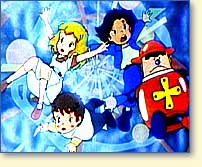
*The robot's voice is also very annoying
*You can tell someone is bad if they have less than three teeth
*A Mexican bulfight guitar strumming song means something big is about to happen
*Joy's skirt is quite short
* I never noticed it before
*I like they way they try to intervene in history and are always foiled
*Goliath was a poet
*What kind of last name is Peepers?
*I'm curious what the marriage episode is about
*When I was a kid, the devil's highwater purple pants were hilarious
This video tells how it all began:
25th anniversary of Superbook
"In addition, some additional edits were necessary for the English dubbed version to make the episodes conform to more conservative (in comparison to Japan) American broadcast standards."

A rather unfortunate scene from Superbook
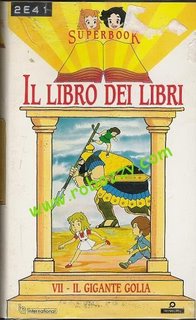
video:
closing them (Japanese)
opening theme
closing theme
I think they redid the song
audio:
opening song
closing song
You can buy the videos and dvd's at:
christian book.com (cheaper)
amazon
you can see some short videos of the show at the main website:
superbookkids.com
from wikipedia:
Superbook (Anime Oyako Gekijo; Animated Parent and Child Theater) is an anime television series produced by Tatsunoko Productions in Japan in conjunction with the Christian Broadcasting Network in the United States. The series chronicled the events of the Bible's Old and New Testaments in its 52 episode run. The first 26 episodes aired from October 1, 1981 to March 29, 1982. The series returned as Superbook II (Pasocon Travel Tanteidan; Personal Computer Travel Detectives) with 26 episodes to air from April 4, 1983 to September 26, 1983. Between both series in the first run was the companion series The Flying House. The series was broadcast on TV Tokyo, CBN Cable (now ABC Family), and in syndication. Episodes are available on both VHS and DVD, (http://www.breakthroughgaming.com has links to the videos and DVD's). It was previously seen on the Trinity Broadcasting Network, but is currently off the schedule. It can now be seen on TBN's "Smile of a Child" network.
In the United States, Superbook was the first animated series with a Christian religious theme to go into syndication since Davey and Goliath in the 1960s. It is likely that many young viewers who watched the series during its initial run in the 1980s were unaware of its Japanese origins, since anime had not yet achieved the widespread popularity in the U.S. that it now enjoys and since CBN removed all Japanese names from the English credits aside from a credit for Tatsunoko for the animation production.
Superbook was criticized by religious conservatives in the United States (many of whom
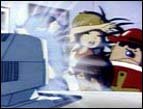 probably were also unaware that the show was Japanese in origin) for "condensing" or "glossing over" the Bible stories it portrayed and for its "jerky" animation style which is nevertheless characteristic of anime TV series in Japan (which generally have much smaller budgets than feature films such as Hayao Miyazaki's works). Many also believed that introducing modern characters (two children and a walking, talking robot) into the stories would confuse and disappoint young readers who would be disappointed not to find such modern characters in the real Bible. Nevertheless, the series has was a huge global success, translated into over 30 languages, and is frequently used as a tool to introduce children and other new Christians to the basics of the Christian faith. Believing that Japanese children would be most responsive to Bible stories and that the best way to reach them was through the media of anime and manga, CBN enlisted Tatsunoko's help in creating the series to help drive Bible sales in Japan, a country where Christians are a minority of the population. It was successful in both audience ratings and in helping to increase Bible sales, although it gets only a brief mention on Tatsunoko's list of works on its Web site. CBN originally did not plan to release Superbook outside of Japan since anime was not considered marketable in the West at the time, but reportedly the network was encouraged by a positive response to the series at a convention in France and went on to prepare the English-dubbed version that would be aired on U.S. television in 1982.
probably were also unaware that the show was Japanese in origin) for "condensing" or "glossing over" the Bible stories it portrayed and for its "jerky" animation style which is nevertheless characteristic of anime TV series in Japan (which generally have much smaller budgets than feature films such as Hayao Miyazaki's works). Many also believed that introducing modern characters (two children and a walking, talking robot) into the stories would confuse and disappoint young readers who would be disappointed not to find such modern characters in the real Bible. Nevertheless, the series has was a huge global success, translated into over 30 languages, and is frequently used as a tool to introduce children and other new Christians to the basics of the Christian faith. Believing that Japanese children would be most responsive to Bible stories and that the best way to reach them was through the media of anime and manga, CBN enlisted Tatsunoko's help in creating the series to help drive Bible sales in Japan, a country where Christians are a minority of the population. It was successful in both audience ratings and in helping to increase Bible sales, although it gets only a brief mention on Tatsunoko's list of works on its Web site. CBN originally did not plan to release Superbook outside of Japan since anime was not considered marketable in the West at the time, but reportedly the network was encouraged by a positive response to the series at a convention in France and went on to prepare the English-dubbed version that would be aired on U.S. television in 1982.To this day, the series has a loyal and devoted fan following around the world, among adults who grew up watching it as well as youngsters. Although, as noted, the original intended audience for Superbook was Japan, the series found even greater success in Christian countries in Africa like Kenya where it aired on National TV. The show was very popular in Kenya. Another African country in which Superbook has become quite popular is the predominantly Muslim nation of Senegal; it was reportedly the first Christian-themed program ever broadcast on Senegalese television. In the Ukraine, the animated series inspired a live-action Barney and Friends-style children's program titled Superbook Club (with the robot Gizmo, or "Robik" in Ukrainian, as the mascot), and there are also several Superbook Club music albums aimed at children.
The series began at the home of a young boy named Christopher Peepers (original name: Sho
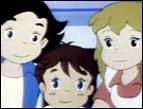 Azuka) who discovers the magical Bible "Superbook" (Timebook) that speaks and sends him and his toy robot Gizmo (Zenmaijikake) back in time to the early events of the Old Testament. Gizmo can walk and talk, but only for the duration of the adventure (and he still needs to be wound up regularly). Chris' best friend Joy (Azusa Yamato in Japanese) accompanies him on his adventures into a time and place that only "Superbook" can help them see for themselves.
Azuka) who discovers the magical Bible "Superbook" (Timebook) that speaks and sends him and his toy robot Gizmo (Zenmaijikake) back in time to the early events of the Old Testament. Gizmo can walk and talk, but only for the duration of the adventure (and he still needs to be wound up regularly). Chris' best friend Joy (Azusa Yamato in Japanese) accompanies him on his adventures into a time and place that only "Superbook" can help them see for themselves.In the first episode, Chris and Joy were cleaning the attic for Chris's father (a somewhat eccentric college professor) when they noticed an old book glowing. The children tried to open the book, but they couldn't open it no matter how hard they pulled. The book promptly opened on its own, shining a blinding light around Chris's bedroom, and started to speak before whisking the children back in time to the Garden of Eden to experience the story of Adam and Eve.
In Superbook II, which took place several years after the first series, the book fell unto a computer keyboard, giving anybody the ability to see into the past from Christopher's home via the monitor. Ruffles, Chris' dog, managed to get lost in time, prompting Gizmo and Chris' cousin Uri (Hisashi in the original Japanese) to search for her. Chris and Joy kept watch and control of the computer from the present. The older children also had a hard time trying to keep what happened a secret from Chris's parents.
The first season of Superbook featured chiefly stories from the Hebrew Scriptures (Old Testament), although a few episodes dealt with the life and ministry of Jesus Christ and the season finale episode was about the conversion of Saint Paul of Tarsus. The episodes in the first season were chiefly one-shot stories, with no overarching "plot" aside from Chris and Joy learning valuable life lessons from their travels in the Superbook. Season One could be
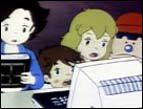 considered a "Cliff's Notes" version of Bible stories, as some condensation or editing of stories was necessary in order to fit them into half-hour episodes and make them suitable for young viewers. In addition, some additional edits were necessary for the English dubbed version to make the episodes conform to more conservative (in comparison to Japan) American broadcast standards.
considered a "Cliff's Notes" version of Bible stories, as some condensation or editing of stories was necessary in order to fit them into half-hour episodes and make them suitable for young viewers. In addition, some additional edits were necessary for the English dubbed version to make the episodes conform to more conservative (in comparison to Japan) American broadcast standards.The episodes in the second season focused solely on Old Testament stories, and Season Two added more detail to some stories already covered in Season One (for example, the stories of Abraham and Joseph). Likewise, The Flying House was a more in-depth look at the life of Jesus and other events from the Christian Scriptures (New Testament).


4 Comments:
i loved superbook! i also liked the hanna-barbera "the greatest adventure" series.
AND i heart veggie tales.
Is that the one with the *mysterious old man story teller voice* SANDS OF TIME and the three archeology kids?
yeppers it is! i always thought archaeology was the coolest, most exciting thing ever when i was little.
I bet Indiana Jones was responsible for a big part of that too.
Post a Comment
<< Home